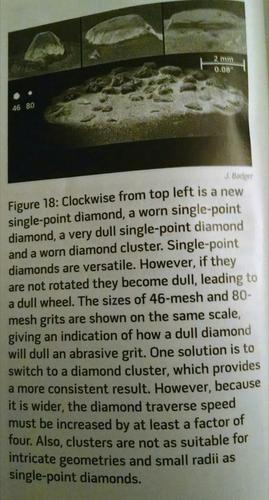Results 11 to 14 of 14
-
08-16-2016, 10:11 PM #11Senior Member

- Join Date
- Sep 2013
- Location
- NW Indiana
- Posts
- 1,060
Thanked: 246
For me, the problem with using coarse diamond hones on razors is the anomalous deep scratches they tend to leave. I agree with Glen that they should only be used if there is a considerable amount of steel to be removed during a repair.
The problem is highly exacerbated by using a relatively new diamond hone also - it's far better to use a more worn in one. The reason for this is the shapes of the scratches left by unworn and relatively sharp peaked diamond grit particles vs. the shapes of those left by more worn and rounded/flattened diamond grit particles. The former are deep and narrow; the latter more shallow and wider.
Although many seem to think that diamonds do not dull and argue that the slowing of cutting speed of a diamond plate is merely the pulling out of diamond particles from the matrix, they most certainly do dull. Here is a good example of what I mean from an industrial magazine I used to subscribe to many years ago:

-
The Following User Says Thank You to eKretz For This Useful Post:
bluesman7 (08-17-2016)
-
08-17-2016, 01:33 AM #12

Diamonds don't dull so much by wear but they do fracture which will alter their shape.
The white gleam of swords, not the black ink of books, clears doubts and uncertainties and bleak outlooks.
-
08-17-2016, 02:57 AM #13Senior Member



- Join Date
- Apr 2012
- Location
- Diamond Bar, CA
- Posts
- 6,553
Thanked: 3215
And, they do pull out, as well, especially if pressure is used.
Look at any well-worn plate and you will see bald spots. The good news is, even worn and balding plates, work well depending on the use. For lapping stones, a good diamond plate will last many, many years.
I have plates 10 years or more old, that I have no question abused… and they still cut and will still lap a stone, maybe slower, but they still work.
And new inexpensive, no-name plates are easy to find, in the 20-30 dollar, price range and they work as well as high dollar plates. They may not be dead flat, but for correction work, or lapping stones, you don’t need dead flat.
Used properly, don’t fully set a bevel with one, just get the bevels flat and close to meeting, then set the bevel, with a 1k, or joint the edge and reset on a 1k and you’ll be fine.
-
08-17-2016, 06:42 AM #14Senior Member

- Join Date
- Sep 2013
- Location
- NW Indiana
- Posts
- 1,060
Thanked: 246
Diamond does wear without fracturing. This should be pretty obvious from the shape of the diamond in the illustration. I've seen this myself myriad times in my diamond wheel dressers. They will wear to a surface exactly tangent to a grinding wheel, with the same radius as the grinding wheel. Although diamond certainly can fracture as well. And yes, of course the diamonds can pull out. The point of the post was not to debate things that obviously occur, but to point out that diamond does indeed wear, just the same as any other substance. It is the hardest natural substance known, but it's not invincible and everlasting the way some fellows seem to think it is.
Last edited by eKretz; 08-17-2016 at 06:45 AM.


 20Likes
20Likes LinkBack URL
LinkBack URL About LinkBacks
About LinkBacks






 Reply With Quote
Reply With Quote
